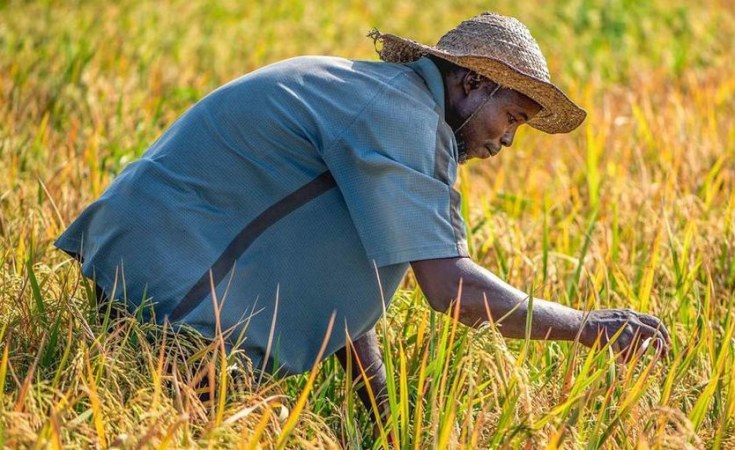Violent extremism and climate change are driving crop growers and stock farmers from their fields in Nigeria. That's a major headache for new President Bola Tinubu.
In early 2023, the United Nations warned that 25 million Nigerians are at high risk of food insecurity, with some analysts calling this a conservative estimate.
The nation's battle to feed its citizens presents a significant challenge for new President Bola Tinubu.
He has promised to assist farmers in "feeding their families and the nation," not just because widespread hunger is a problem for the new administration, but also because its causes lie in a larger crisis threatening Nigeria: insecurity.
Agriculture a vital part of economy
"Small-scale farmers in Nigeria produce almost 90% of the food that people consume in the country," said Adeoye Akinola, a Johannesburg-based specialist on monitoring violence affecting rural communities across Africa. He added that over 70% of Nigerians are involved in some form of agriculture.
Nigeria's agricultural sector contributes over 22% of the country's gross domestic product , dwarfing the oil sector, which ranges from about 6 to 9%.
Yet on the plains of northern Maiduguri, farmers are fighting the pressure of growing enough food to feed Africa's most populous country while under constant fear of being attacked.
Ali Bukar, a groundnut farmer on the outskirts of Maiduguri, walks across a dusty field carrying a wooden hoe. He's a slight man.
"This is not my initial farm," he said. "I have a very big farm which is far from here. Boko Haram elements used to collect huge amounts from us before we farm in that place. Even after the payment they would kidnap and sometimes kill our people. That's why I ran away and settled here which is very close to the town."
But the safety has come at a price. "What I'm getting here is very little. I used to get over 20 sacks of either millet, sorghum or maize. But here I only go for groundnut and what I'm getting is two or three sacks of produce."
The threat is more direct for another farmer, Ruth Dauda. "We are farming in serious fear because there are no security agencies that give us cover. They only patrol the area sometimes," she said. "We close very early in the afternoon because we don't know what is going to happen if we stay longer."
Goni Alhaji Bukar, a veteran farmer from Maiduguri, explained that in the past, it was safe to farm well into the night.
"But these days Boko Haram is threatening us. Whenever you are on the farm, your attention is divided, thinking that you may hear a sound of a gunshot or the insurgents will chase you or ask you to pay ransom," he said.
"As a farmer, if I did not go to farm, what do you expect at the end of the rainy season? Is it not a loss?" he added.
Tinubu's reputation depends on security
Security analyst Kabir Adamu of Beacon Consulting said President Tinubu would be keen to prove he can project security, as it's seen as a constitutional duty and a political necessity.
"Every other aspiration that Tinubu has as a leader and that his government has will not be met if security is not provided," he told DW.
"Food security is not just necessary, but it's absolutely important in this context. And you cannot achieve food security if a significant portion of your agricultural sector is not active as a result of insecurity."
According to the UN's Food and Agriculture Organization, between 2016 and 2019 Nigeria's cumulative agriculture exports amounted to 803 billion naira (Ꞓ1.5 billion/$1.2 billion), four times lower than the agricultural imports. Yet the looming hunger crisis is unlikely to be solved by large-scale food imports because of how deeply intertwined the economy and food production is in rural Nigeria.
"That [relying on imports] will incapacitate those rural dwellers that rely on the sale of their farm products. When you begin to import all the food that a country will consume, the country is also at risk because they become dependent on food importation," explained Akinola.
The COVID-19 pandemic also revealed glaring problems with this solution. According to Adamu, Nigeria realized it could not rely on imports.
"It took a very long period before those arrived in the country," he said, noting that supply chains were disrupted.
Other factors complicating agriculture gains
Insecurity is just one of myriad problems facing Nigeria's agriculture sector. Climate change, flooding and creeping desertification have incapacitated swaths of farmland.
Poor infrastructure has not allowed supply chains to add value to existing agricultural produce. A new European-funded tomato processing plant that opened in 2020 in Kebbi state has been out of operation since bandits attacked it.
Attracting large-scale investment in agriculture has been challenging, with local and international ventures concerned about the security costs of running an operation in rural areas. But Akinola also pointed to pessimism, "particularly with the experience of the Niger Delta situation, where you have oil and multinational corporations coming into this space exploiting oil."
"And, we have seen the negative power play between the oil companies and the communities," he told DW.
As Tinubu settles into his new role as president and Nigeria's pundits continue to debate the country's ability to stem insecurity, farmer Ruth Dauda continues to hoe away at the dry earth near Maiduguri.
"Even if the government is giving support to farmers as far as we are concerned it will never reach us. We are farming with our personal earnings and strength," she said.
Edited by: Benita van Eyssen


